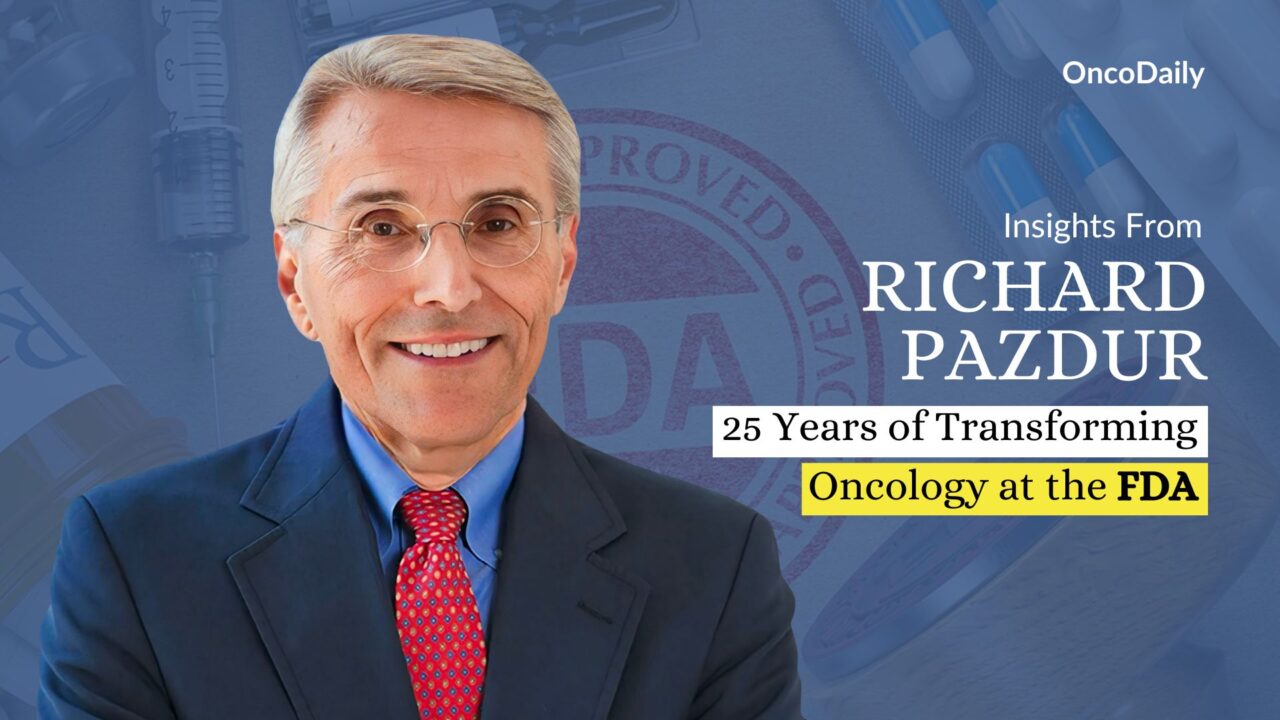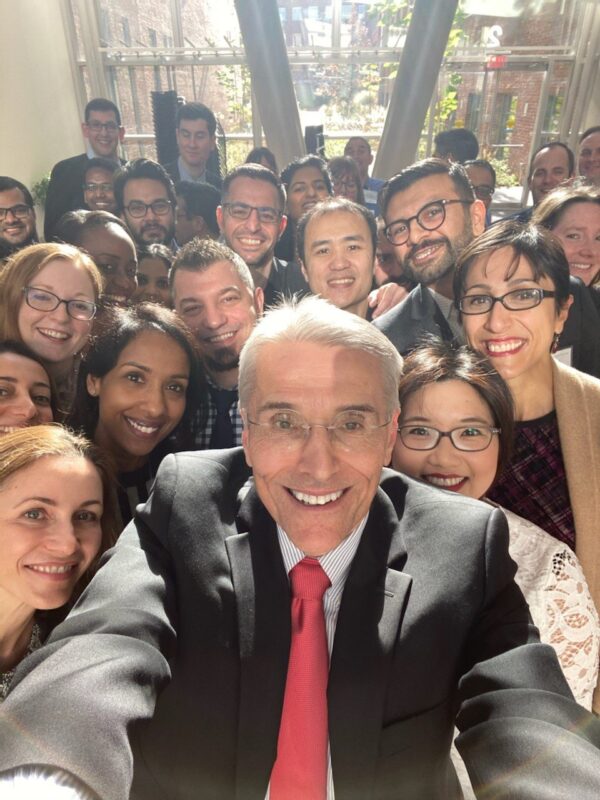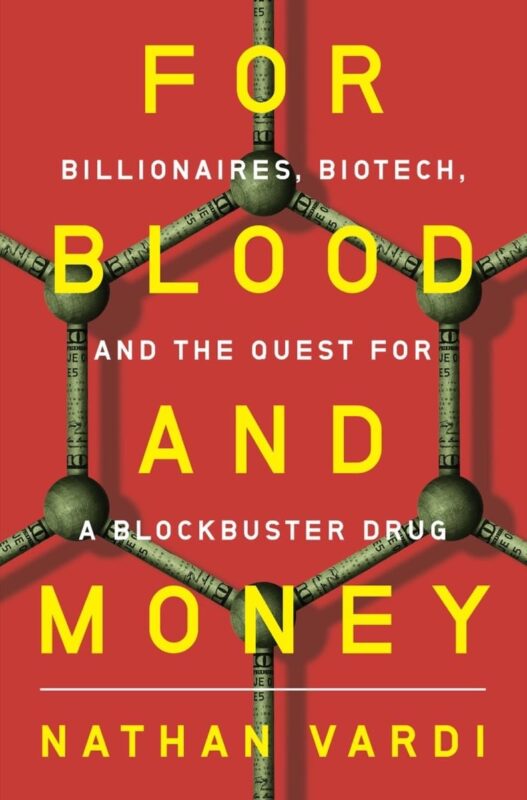
Dr. Richard Pazdur: 25 Years of Transforming Oncology Drug Development at the FDA
In a career that spans nearly half a century in oncology, including 25 years at the U.S. Food and Drug Administration (FDA), Dr. Richard Pazdur has redefined the agency’s role in oncology drug development. As the director of the FDA’s Oncology Center of Excellence (OCE), he has overseen revolutionizing changes in the development of oncology drugs, fostering a transformative impact on medical oncology.
This interview captures Dr. Pazdur’s reflections on his legacy, the evolution of oncology, his approach to mentorship, and his insights on future challenges and opportunities in the field.
Reflecting on 25 Years of Progress at the FDA
Dr. Richard Pazdur’s tenure at the FDA has been marked by significant progress in oncology drug development. “I always look back at the times when I was just beginning oncology, and that was in 1979 when we only had about 35 to 40 oncology drugs,” he reflects. “Now, almost every year, we approve somewhere between 10 to 15 new molecular entities for the treatment of the diseases that are classified as oncology diseases,” Dr. Pazdur adds.
During his career at the FDA, Dr. Pazdur has overseen the rebirth of immunotherapy and advances in the development of transformative therapies like CAR T-cell therapies and checkpoint inhibitors, which have changed the prognosis for diseases such as multiple myeloma and melanoma. One of the most memorable moments for Dr. Pazdur was the approval of Imatinib (Gleevec), a breakthrough in treating chronic myeloid leukemia (CML). “Before Imatinib, basically we were controlling the counts of patients with CML and actually just monitoring the natural progression of the disease,” he states. “It was an ‘aha moment’—seeing a breakthrough therapy and realizing there is true magic here.” Dr. Pazdur shares his feelings about a time when they were approving Imatinib. “However, it is somewhat of a bittersweet moment. One, of having these breakthrough therapies, but then also realizing that some of the past generations of patients did not have access to these drugs that they just by chance were not here at the time when this drug was developed,” he says.
Shaping a Lasting Legacy through Mentorship and Organizational Growth
For Dr. Pazdur, his greatest legacy lies in the people and culture he has cultivated within the FDA. He underscored the importance of specialized expertise, noting that the OCE now has over a hundred medical oncologists—up from just ten in 1999. This growth reflects his vision of the FDA as not only a regulatory body but a pivotal player in the broader oncology community. “We, at the FDA, are only as good as the people that are working in the review divisions here,” he stresses.
Dr. Pazdur also highlights the value of mentorship, as he encourages his team members to seek opportunities and remain committed to their professional growth. “When people come and tell me they’re leaving the FDA, I think they expect me to say, ‘Please stay. Don’t leave.’ I just ask them to make sure they’re leaving for something, not away from something,” he shares. “I can’t discourage people from having other careers and other opportunities. But here again, you need to have a vision when you go into a job of what you want that job to be, how you’re going to mold that job, and what advantages it is going to be for you. Again, leave toward an opportunity rather than moving away from something.” This approach, rooted in his own diverse career path, reflects Dr. Pazdur’s dedication to nurturing future leaders and supporting their success, both within and beyond the FDA.

Richard Pazdur with ASCO fellows and FDA OCE faculty at the FDA White Oak campus. 11/05/2019. Photo from FDA Oncology/X
The Future of Cancer Care: What to Expect in the Next Five to Ten Years
Looking ahead, Dr. Pazdur foresees rapid advancements in tumor immunology. He highlights the significant impact of checkpoint inhibitors, which had a tremendous impact on the treatment of patients with oncological diseases, providing new treatment options across a wide range of cancers. “Some of these drugs now have over 40 indications,” he notes, underscoring their broad application and success in oncology.
Dr. Pazdur also anticipates a shift in how these therapies are used. “What we’re also going to see, and we’re seeing this already, is the introduction of these therapies that were initially developed in the advanced disease setting, moving forward into the neoadjuvant and adjuvant setting, and this obviously offers a chance for a cure to patients with these malignancies,” he explains, hinting at the potential for immunotherapies to play a curative role in cancer treatment in the near future.
Addressing Global Inequities in Drug Access and Clinical Trials
When asking about the fact that the vast majority of immunotherapy clinical trials in the last decade were conducted in high-income countries (HICs), with very limited participation (only 2.4%) from low- and middle-income countries (LMICs) and zero countries from the low-income group were involved, he points that the OCE has initiated programs like Project Orbis, which attempts to encourage simultaneous review of oncology drug applications by the FDA and regulatory authorities from various countries, including those in Western Europe, Israel, Brazil, Australia, Canada, Japan, and the United Kingdom. Through Project Orbis, the FDA encourages a global presence for drug development, ensuring that diverse patient populations are represented.
Dr. Pazdur highlights the importance of diversity within clinical trials, not only for global health equity but also for the quality of data that informs treatment in the U.S. “We are a diverse population in the United States, and we need information from outside our borders to understand how drugs interact across different ethnicities,” he explains. This includes encouraging trial sites in regions like Central America and Sub-Saharan Africa, where unique insights can be gained regarding drug metabolism and efficacy in various populations.
According to Dr. Pazdur, with approximately 20% of the total oncology trial accrual occurring in the U.S., the FDA relies on international trials to enrich its understanding and to ensure that treatments are applicable across populations. He emphasizes that a globally representative trial population instills greater confidence in the results being extrapolated to the diverse population in the United States and accelerates the availability of medications to diverse communities worldwide.
Reimagining Pediatric Oncology: A Call for Dedicated Research and Innovation
Pediatric oncology, which played a foundational role in early cancer research, has seen its focus wane as advancements in adult oncology took center stage. Addressing this, Dr. Pazdur highlights the need for a paradigm shift in pediatric cancer drug development. “Most of the initiatives have rested on the foundation of taking drugs that were developed in adults and then exploring them in children. And I think we really have to rethink this, and should we have really primary development of drugs in pediatric malignancies, cognizant of the biology that’s different, cognizant of the fact that they are different diseases than that occurs in adults,” he states.
In the United States and Europe, legislative efforts have aimed to bridge this gap by encouraging drug trials for children. However, these programs still often rely on adult oncology research as a starting point. “I think one of the things that we should take a look at is potentially looking at drugs specifically aimed at childhood malignancies rather than trying to repurpose drugs that have already been developed in adult malignancies,” Dr. Pazdur stresses.
So, the future of pediatric oncology, he believes, lies in developing drugs that target the unique characteristics of childhood malignancies. By prioritizing research and resources specifically for pediatric cancers, there is potential to make meaningful progress and address the unique needs of young patients facing cancer.
The Media’s Role in Educating and Empowering Cancer Patients
Dr. Pazdur underscores the crucial role of media in educating the public about available treatments, especially in a field as rapidly evolving as oncology. He firmly believes that media platforms are essential in helping patients understand the importance of new therapies and where they fit within the broader landscape of existing treatments. “Many times, when I was in practice, I saw patients come with requests for treatments that were totally inappropriate because they really didn’t understand the context where these discoveries were developed.” he says.
For Dr. Pazdur, the media’s responsibility goes beyond merely reporting on new therapies—it involves placing these treatments in context to help patients make informed decisions. “I think one of the major challenges for the media is how to put these new therapies into context for individual patients,” he notes. So, by offering clear and relevant information, media outlets can empower patients to better understand their treatment options and have more productive conversations with their healthcare providers.
As for healthcare providers, Dr. Pazdur firmly believes that patients should rely on their physicians as “the captain of the ship” in guiding their care. They should become partners, and this partnership, rooted in trust and informed by accurate information, is vital for effective cancer treatment.
Top Books to Read: Dr. Pazdur’s Recommendations
When asked about his top book recommendation, Dr. Pazdur highlighted For Blood and Money by Nathan Vardy. This book, he explained, provides a unique perspective on the world of drug development, particularly the behind-the-scenes journey of BTK inhibitors. “It explains what goes on within drug companies—the decisions, the priorities, and the challenges,” he states. Dr. Pazdur found Vardy’s work particularly enlightening, as it offers insights into the financial and strategic dynamics that often remain unseen by regulatory agencies like the FDA.

In addition to his recommendation of For Blood and Money, Dr. Pazdur shared his admiration for the works of historian Doris Kearns Goodwin. Known for her presidential biographies, Goodwin’s books, such as No Ordinary Time, which explores World War II and what was going on in the White House during that time. “Excellent writer, recently wrote a book regarding her life story with her husband, which is also just a very sentimental and really impactful book to read,” Pazdur concluded.
Dr. Pazdur’s career at the FDA reflects his enduring commitment to advancing oncology and mentoring the next generation of oncologists and regulators. As the field of oncology continues to evolve, his insights and initiatives pave the way for a future where innovative cancer treatments are not only developed but accessible to diverse populations worldwide.
Interview by Gevorg Tamamyan, MD, MSc, PhD, DSc, with article written by Yeva Margaryan, MD, MPH.
-
Challenging the Status Quo in Colorectal Cancer 2024
December 6-8, 2024
-
ESMO 2024 Congress
September 13-17, 2024
-
ASCO Annual Meeting
May 30 - June 4, 2024
-
Yvonne Award 2024
May 31, 2024
-
OncoThon 2024, Online
Feb. 15, 2024
-
Global Summit on War & Cancer 2023, Online
Dec. 14-16, 2023
